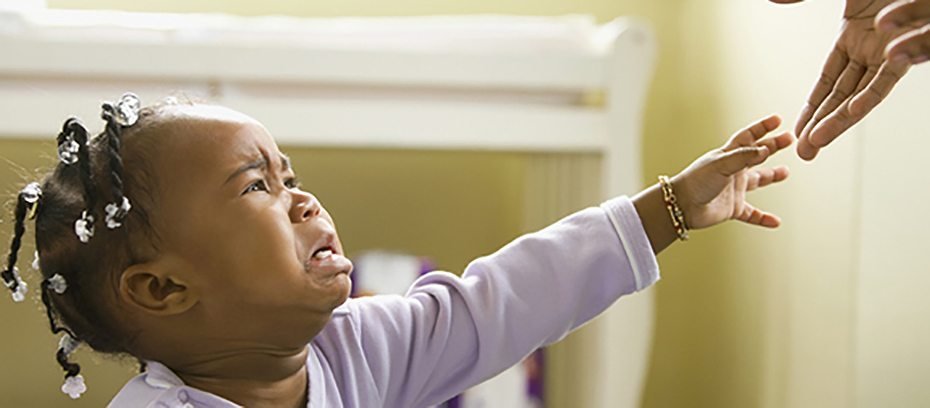Infant and Toddler Separation Anxiety at Daycare
Infant and Toddler Separation Anxiety at Daycare
Usually between 6-8 months of age your baby will begin to exhibit signs of separation anxiety that will often peak between 10-18 months. This is a completely normal phase and is actually quite healthy. It means your precious one is maturing to the place where they have a strong preference for parents, as they should, and their cognition is getting more and more advanced. It begins when they reach the time when they can comprehend that things and people exist even when they’re not present – something called “object permanence.”
It’s heartbreaking to hand your crying infant over to their caregiver and be forced watch helplessly they wail and reach for you as you leave them and rush to work. It goes against the very nature of parenting. The biological instinct is deep in our DNA to protect and nurture, and prevent your child from experiencing stress. But alas.. bills must be paid!
separationanxity
The good news is that although the length and severity will vary greatly from child to child, separation anxiety is temporary.
It’s very important to choose childcare that will allow you the time to properly integrate your child into the new setting. Talk to the director about being able to visit the school every day a week prior to your child’s first day. It’s good to go there with your child and spend time hanging out in each of the rooms that your child will be in during the day so they get a sense of comfort by seeing you relax in this new place.
Next, you want to do some trial runs. After you’ve had a chance to spend time at the new facility or home, it’s time to do some short drop-offs. By short, I mean making sure your baby sees you leave (this is crucial), but then instead of being gone for the day like you will be normally, only stay gone for 15-20 minutes max. Because babies have short memory spans, this will allow your child to feel the stress of being left, but then see that you come right back. Do this as many days in a row as your provider will allow before their first day. This will imprint on them that this is a place they will be without mommy and daddy, but that mommy and daddy always come back. I can’t stress enough how important this slow introduction is.
Here are some more things you can do to help lessen the severity and the length and create a much less stressful drop-off at daycare.
1. Don’t drag out saying goodbye and don’t sneak out either. Keep it simple — one kiss, one hug and out the door you head. And never bring your child home with you.
2. Keep your own emotions in check. Kids are surprisingly adept at picking up on what we grown-ups are feeling, even if we are trying to hide it.
3. Discuss what is going on with your child’s teacher, but not during drop-off or pick-up time. Make an appointment to discuss the matter privately.
4. See if you can get another relative or friend to bring your child to school to see if a change in routine makes a difference.
5. Be prepared for your child to regress a bit after vacations, after he’s been out sick or if something eventful is going on at home, like the birth of a sibling or a move to a new home.
6. If you haven’t already, introduce your child to a new blankey or stuffed animal at home. Once they get use to it there, bring it with them to school to give them some loving security!
About the Author: Genevieve
As the current Owner & Executive Director of 4 preschool centers, Genevieve has over 20 years experience in early childhood education as well as almost a decade of work in the fields of sustainability and green business. Genevieve has always carried an eco-conscious approach to life and shares those imperative philosophies with the children she teaches. She continues her work with Origins Education, combining her passion for children, her expertise in early childhood education and her knowledge of the principles of sustainability and the new economy movement. Origins Education’s goal is help foster a generation of young people committed to enhancing the health and wealth of their own communities and ecosystems, to nurture a sense of caring for the Earth and all its inhabitants and to support a lifestyle grounded in an Earth and human-centered ethic.

